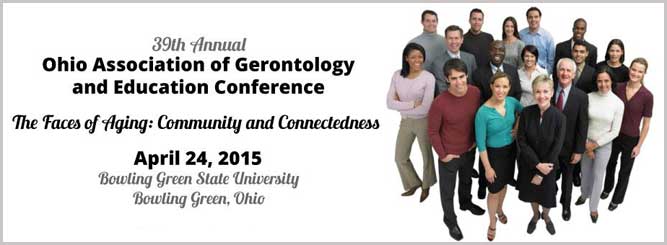Workshop – Service Learning
Location
BTSU 201
Start Date
4-4-2015 11:30 AM
End Date
4-4-2015 12:30 PM
Description
This workshop is geared toward faculty and staff at universities who would want to integrate service learning into their courses as well as community partners who would like to explore a service-learning opportunity with a campus partner. The definition of service learning and how it is different from other forms of experiential learning will be discussed. Concepts will be illustrated using a short video clip and other real life examples. The service learning criteria of Meaningful Service, Enhanced Academic Learning, and Purposeful Civic Learning will be identified. The application of these criteria will be illustrated through BGSU service-learning courses - the Listening Post and Small Group Communication are two courses that have integrated older adults into the curriculum. Specific examples and strategies will be described.
The role and importance of continuous reflection will be described. Participants will receive handouts on the What, So What, Now What model and the DEAL Model of Critical Reflection. Emphasis on the mutual benefit for community partners will be shared along with best practices in Community Partnerships.Participants will have the opportunity to brainstorm potential courses and community partnerships for service-learning. Using an Action Plan handout, faculty and staff participants will identify new or existing courses at their institutions to apply service-learning pedagogy, identify one learning objective related to each criteria, list potential community partner to support learning objectives, and list potential challenges. Community partner participants and practitioners will have the opportunity to develop a partnership action plan. They will receive a similar Action Plan handout to brainstorm how their organization might be able to utilize a service-learning partnership; identifying potential projects, why they would fit as service-learning, and what action steps they could take to initiate a partnership with a local campus.
Additional resources for service-learning will be identified including Ohio Campus Compact (funding, program models), Campus Compact syllabi database, and Offices of Service-Learning on various campuses.
Listening Post Handout.pdf (103 kB)
ICI Project Handout.pdf (183 kB)
Included in
Learning Through Serving: Learning Service-Learning Pedagogy to Enhance your Teaching
BTSU 201
This workshop is geared toward faculty and staff at universities who would want to integrate service learning into their courses as well as community partners who would like to explore a service-learning opportunity with a campus partner. The definition of service learning and how it is different from other forms of experiential learning will be discussed. Concepts will be illustrated using a short video clip and other real life examples. The service learning criteria of Meaningful Service, Enhanced Academic Learning, and Purposeful Civic Learning will be identified. The application of these criteria will be illustrated through BGSU service-learning courses - the Listening Post and Small Group Communication are two courses that have integrated older adults into the curriculum. Specific examples and strategies will be described.
The role and importance of continuous reflection will be described. Participants will receive handouts on the What, So What, Now What model and the DEAL Model of Critical Reflection. Emphasis on the mutual benefit for community partners will be shared along with best practices in Community Partnerships.Participants will have the opportunity to brainstorm potential courses and community partnerships for service-learning. Using an Action Plan handout, faculty and staff participants will identify new or existing courses at their institutions to apply service-learning pedagogy, identify one learning objective related to each criteria, list potential community partner to support learning objectives, and list potential challenges. Community partner participants and practitioners will have the opportunity to develop a partnership action plan. They will receive a similar Action Plan handout to brainstorm how their organization might be able to utilize a service-learning partnership; identifying potential projects, why they would fit as service-learning, and what action steps they could take to initiate a partnership with a local campus.
Additional resources for service-learning will be identified including Ohio Campus Compact (funding, program models), Campus Compact syllabi database, and Offices of Service-Learning on various campuses.


